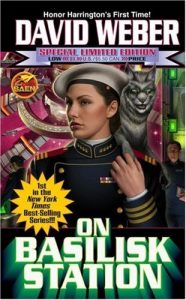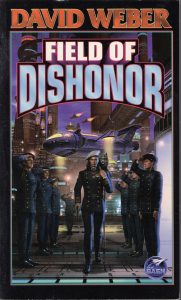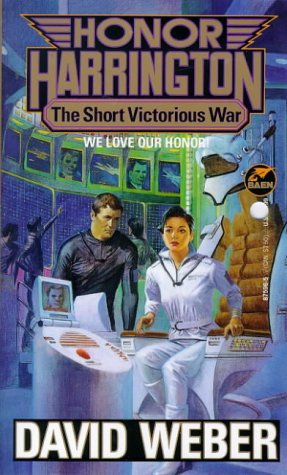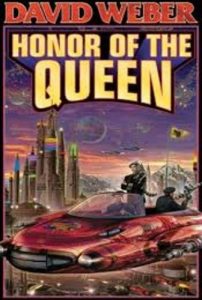 I’m having a hard time writing a cold review of On Basilisk Station, because I myself did not come to it cold; instead, a string of reviews by Mike Kozlowski has colored my perceptions of the entire series for the whole time I’ve been aware of its existence. It is like being in your twenties and finally watching this Star Wars movie you’ve heard so much about from the thirty-somethings you hang out with. And so I’ve got the simultaneous experience of the book itself intertwined with various snickerings as I note the exact kinds of things about the books that he had previously said that are just so ridiculous, and I have to wonder if they’d have struck me as forcibly, at least in this first book, if I hadn’t already known what was coming.
I’m having a hard time writing a cold review of On Basilisk Station, because I myself did not come to it cold; instead, a string of reviews by Mike Kozlowski has colored my perceptions of the entire series for the whole time I’ve been aware of its existence. It is like being in your twenties and finally watching this Star Wars movie you’ve heard so much about from the thirty-somethings you hang out with. And so I’ve got the simultaneous experience of the book itself intertwined with various snickerings as I note the exact kinds of things about the books that he had previously said that are just so ridiculous, and I have to wonder if they’d have struck me as forcibly, at least in this first book, if I hadn’t already known what was coming.
In any event, a rundown for you: a couple of thousand years from now, give or take a century, mankind has spread throughout the stars, only with none of that Earth-That-Was nostalgia for a vanished planet. In fact, the Solarian League (or something like that) is one of the biggest players in galactic politics, though they play no particular role in this first book of the series. And the aliens, such as they are, all appear to be way behind mankind. But that’s because this is a very 18th-19th Century setting, only with spaceships instead of boats, and of course all the European countries were the most advanced, with the native tribes there only to be enlightened or used as catspaws, depending on whether you (like our plucky heroine, Honor Harrington) are a member of the Royal Manticoran system of planets or are one of the socialist and expansionistic bad guys, such as the Republic of Haven are mostly peopled by. Because this isn’t actually 19th C. European politics and warfare, you understand. It’s the future, and we’re in space!
All you really need to know about Honor Harrington is that she’s very very smart, both as a manager of people and as a military tactician. Possibly as a strategist too, but for now she is only the captain of one fast-response warship, the HMS Fearless, so we don’t get to see her conducting a full-scale war like Luke Skywalker does sometimes. At least, not yet, and it’s good we’re in the future, because the Force would not do Luke much good against Honor. Anyway, I may be drifting a bit afield here. The point is, Honor has lots to overcome. For example, she did a bad job in a military exercise because her old reliable weapons were traded in for new technology that only works at close range if the enemy doesn’t expect you to have it, and for some reason everyone expected her to have it in the second through twentieth runs of the exercise. Thanks to this embarrassment of the weaponry and strategic thinking behind it, she and her ship get sent out to the middle of nowhere (on Basilisk Station, you are no doubt shocked to learn) for a pointless picket duty, inspecting merchant cargo for contraband. Also, her crew is angry at her, her executive officer doesn’t respect her (even though he constantly berates himself for it, since he knows she deserves his full support, for being as awesome as she is), and her doctor is a slacker. And this career failure in the making doesn’t even take into account the Republic of Haven and their expansionism that I mentioned earlier.
I think I have never read more escapist fiction, is my point here. I will not speed through them, but I am looking forward to the next one despite myself. Because no matter how bad things get, she’ll be an impressive genius. If you dropped her naked into the middle of the Australian Outback, she would not walk out alive three weeks later. She and her Aboriginal Air Force would have already conquered Sydney by then and be making plans for how to take on China. (I mean, she wouldn’t do those things for the hell of it; we can take it as read that Sydney and China are bad guys, because otherwise they would already be plying her with fresh accolades instead of resisting.)
Also, for some reason, she has an empathic six-legged cat. The book is… well, “good” is not the correct word here. The book is entertaining despite said cat. My understanding is that it is exactly the same as reading Horatio Hornblower stories, but I have never done this thing. So if you like those, or like over-the-top awesomeness that cannot be prevented by any government-built levee, or probably if you like empathic six-legged cats for some reason, then this right here is the book (and probably the series) for you. I know I’ll read more, because even if she is too awesome for me on paper[1], it is impossible to deny the holy-shit face-splitting grins that occurred several times over the course of the last few chapters of the book.
[1] Yes, yes, but I mean it metaphorically.
 I have a feeling that, with the loss of the original author, there’s at least a decent chance I have something like eighty Deathlands books left to read that all have randomly extruded titles. The somewhat better news is that the new author[1] has a better handle on the characters than in the last book.
I have a feeling that, with the loss of the original author, there’s at least a decent chance I have something like eighty Deathlands books left to read that all have randomly extruded titles. The somewhat better news is that the new author[1] has a better handle on the characters than in the last book.
 It’s been a while since I’ve
It’s been a while since I’ve  I do not wish to be too sick to write a review, as what if I fall behind in my reviewings? But contrariwise, what if I write a useless review to which people respond, “Hey, stop writing reviews while you’re sick, Sicky!” And then… well, I haven’t really been able to define the bad thing that happens next, probably because my head is too simultaneously congested and medicine-floaty to concentrate that long. But clearly, consequences will abound. All the same, I’ve written way too much to back down now, even if none of it has anything to do with Honor Harrington just yet.
I do not wish to be too sick to write a review, as what if I fall behind in my reviewings? But contrariwise, what if I write a useless review to which people respond, “Hey, stop writing reviews while you’re sick, Sicky!” And then… well, I haven’t really been able to define the bad thing that happens next, probably because my head is too simultaneously congested and medicine-floaty to concentrate that long. But clearly, consequences will abound. All the same, I’ve written way too much to back down now, even if none of it has anything to do with Honor Harrington just yet. I’m having a hard time writing a cold review of
I’m having a hard time writing a cold review of